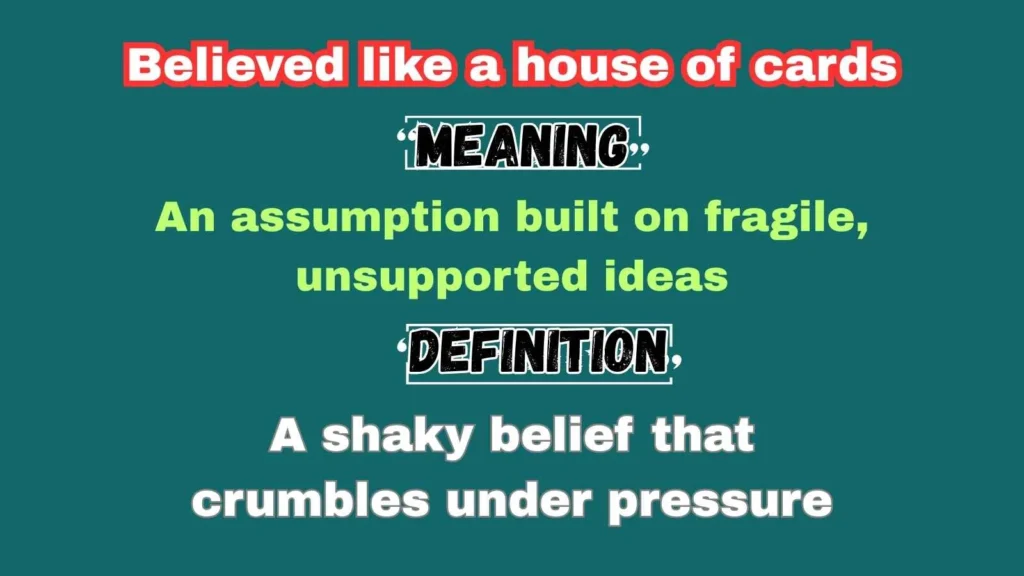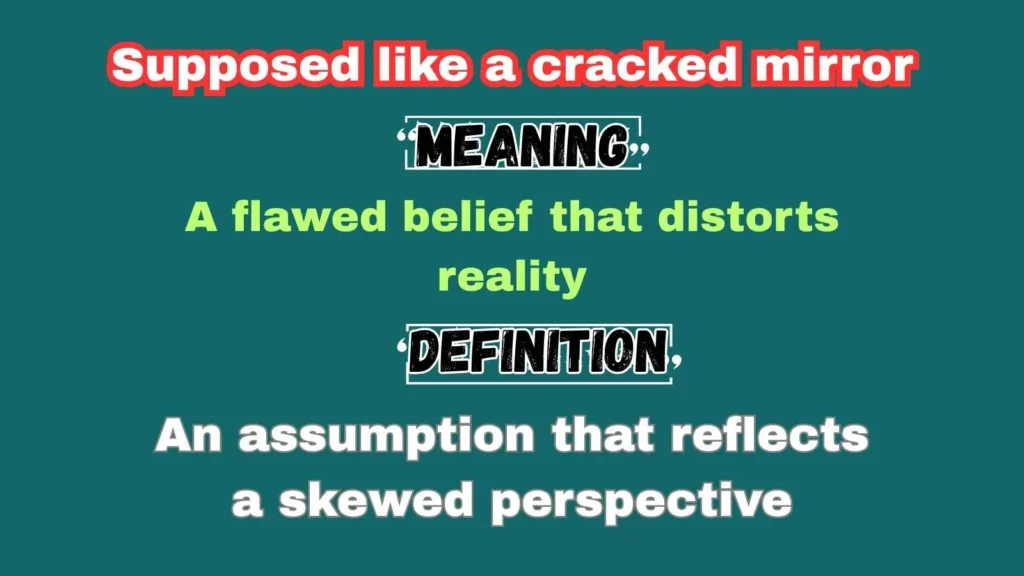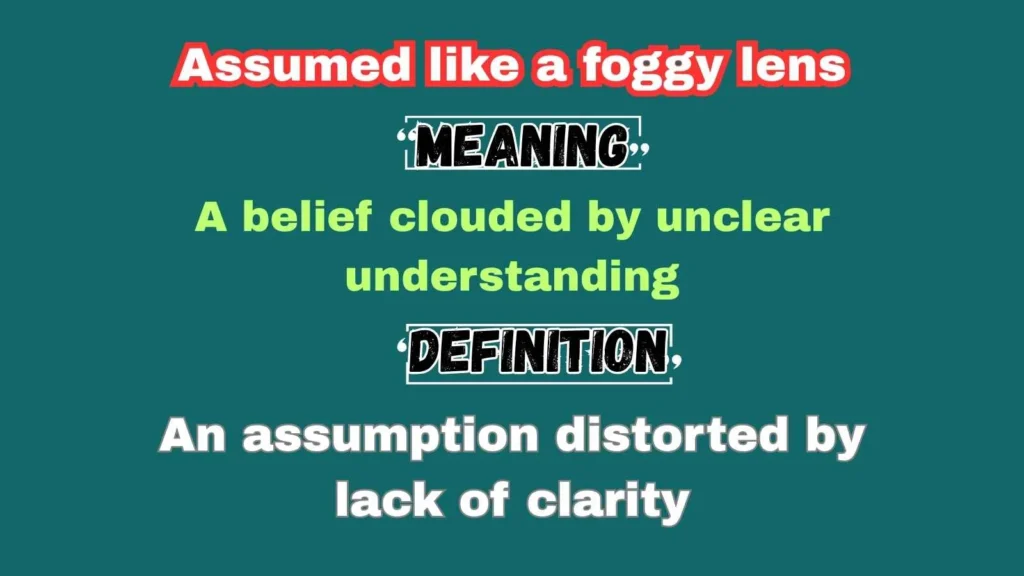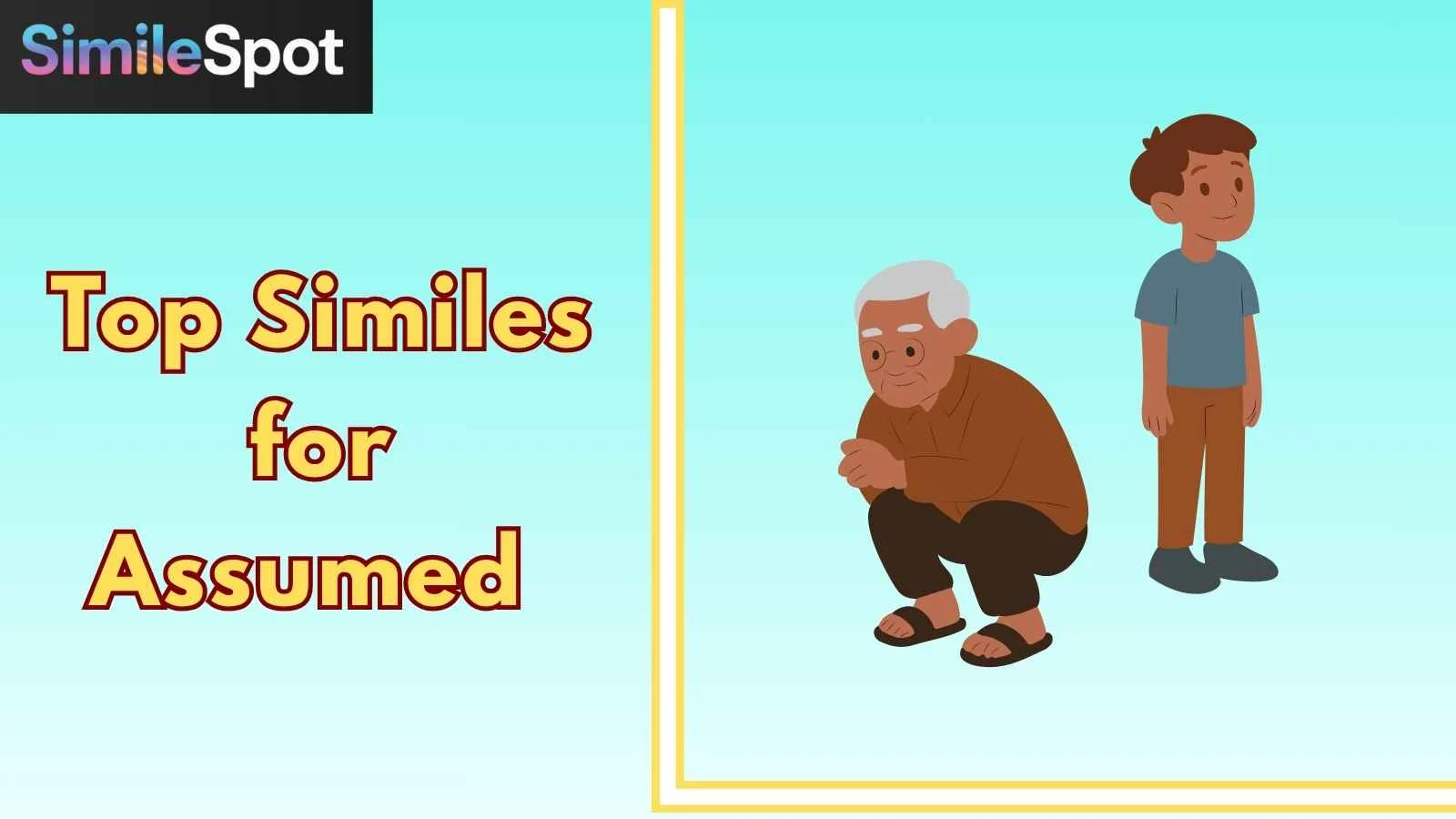A simile paints a vivid picture by comparing two unlike things using “like” or “as,” turning ordinary ideas into something memorable. Assumptions, those quick judgments we make daily, are fascinating because they shape how we see the world—sometimes accurately, sometimes not.
Exploring similes for “assumed” unlocks creative ways to describe this mental leap, sparking curiosity and depth in your writing.
Whether you’re crafting a story, poem, or essay, these comparisons will inspire you to weave assumptions into your work with flair. Keep reading to discover a vibrant list that will transform your creative expression and make your words unforgettable.
Quick Definition of a Simile
A simile is a figure of speech that compares two different things using “like” or “as” to create a vivid, imaginative description.
Table of 5 Quick Similes for Assumed
| Simile | Meaning | Example Sentence |
|---|---|---|
| Assumed like a fleeting shadow | A quick, unconfirmed belief that fades under scrutiny | She assumed his intentions like a fleeting shadow, unsure if they were real. |
| Assumed like a house of cards | A belief built on shaky, unverified grounds | His confidence was assumed like a house of cards, ready to collapse with one question. |
| Assumed like a mirage in the desert | A belief that seems real but vanishes upon closer look | She assumed his promise was true, like a mirage in the desert, only to find it empty. |
| Assumed like a half-read book | A judgment based on incomplete information | He assumed her motives, like a half-read book, missing the full story. |
| Assumed like a whispered rumor | A belief spread quickly without solid proof | The team assumed victory, like a whispered rumor, before the game even started. |
Assumed like a fleeting shadow
- Meaning: A belief that feels real but disappears when examined closely.
- Definition: A quick, unsubstantiated assumption that lacks permanence.
- Example 1: She assumed his loyalty was unshakable, like a fleeting shadow, until he vanished.
- Example 2: His trust in the plan was assumed like a fleeting shadow, gone with one setback.
Believed like a house of cards

- Meaning: An assumption built on fragile, unsupported ideas.
- Definition: A shaky belief that crumbles under pressure.
- Example 1: She assumed his story was true, like a house of cards, until the facts toppled it.
- Example 2: His confidence was assumed like a house of cards, fragile and easily disproven.
Presumed like a mirage in the desert
- Meaning: A belief that appears certain but proves illusory.
- Definition: An enticing but false assumption.
- Example 1: He assumed her smile meant agreement, like a mirage in the desert, only to learn otherwise.
- Example 2: The team assumed success was near, like a mirage in the desert, but obstacles remained.
Judged like a half-read book
- Meaning: An assumption based on incomplete or partial knowledge.
- Definition: A conclusion drawn without the full context.
- Example 1: She assumed his silence meant guilt, like a half-read book, missing his true feelings.
- Example 2: He assumed the project was doomed, like a half-read book, unaware of its potential.
Taken like a whispered rumor
- Meaning: A belief that spreads quickly but lacks evidence.
- Definition: An assumption fueled by hearsay, not facts.
- Example 1: They assumed her success was luck, like a whispered rumor, ignoring her hard work.
- Example 2: He assumed the news was true, like a whispered rumor, without checking the source.
Supposed like a cracked mirror

- Meaning: A flawed belief that distorts reality.
- Definition: An assumption that reflects a skewed perspective.
- Example 1: She supposed his kindness was genuine, like a cracked mirror, misjudging his intent.
- Example 2: His view of her skills was supposed like a cracked mirror, warped by bias.
Guessed like a coin toss
- Meaning: A random, uncertain assumption with no clear basis.
- Definition: A belief based on chance rather than evidence.
- Example 1: He guessed her decision, like a coin toss, with no clue about her reasoning.
- Example 2: The team guessed the outcome, like a coin toss, hoping for the best.
Imagined like a dream’s echo
- Meaning: A belief that feels vivid but lacks substance.
- Definition: An assumption rooted in fleeting imagination.
- Example 1: She imagined his support, like a dream’s echo, only to wake to reality.
- Example 2: His optimism was imagined like a dream’s echo, fading with the morning.
Expected like a fragile thread
- Meaning: A delicate assumption that easily breaks.
- Definition: A belief that’s easily disproven or shattered.
- Example 1: She expected his loyalty, like a fragile thread, until it snapped under pressure.
- Example 2: His trust was expected like a fragile thread, broken by one lie.
Concluded like a puzzle with missing pieces
- Meaning: An assumption formed without all the facts.
- Definition: A belief based on incomplete information.
- Example 1: He concluded her absence was intentional, like a puzzle with missing pieces, missing the truth.
- Example 2: She concluded the deal was done, like a puzzle with missing pieces, unaware of issues.
Assumed like a foggy lens

- Meaning: A belief clouded by unclear understanding.
- Definition: An assumption distorted by lack of clarity.
- Example 1: His view of her motives was assumed like a foggy lens, blurred by doubt.
- Example 2: She assumed his words were true, like a foggy lens, missing the deception.
Believed like a sinking anchor
- Meaning: A heavy assumption that drags down judgment.
- Definition: A belief that burdens with false certainty.
- Example 1: He believed her promise, like a sinking anchor, pulling him into disappointment.
- Example 2: The team believed in victory, like a sinking anchor, ignoring the odds.
Presumed like a fading star
- Meaning: A belief that shines briefly but loses its glow.
- Definition: An assumption that seems bright but fades quickly.
- Example 1: She presumed his interest was real, like a fading star, until it dimmed completely.
- Example 2: His confidence was presumed like a fading star, lost in the light of truth.
Judged like a locked door
- Meaning: An assumption that blocks further understanding.
- Definition: A belief that shuts out new perspectives.
- Example 1: He judged her intentions, like a locked door, refusing to hear her side.
- Example 2: She judged his skills, like a locked door, ignoring his potential.
Taken like a borrowed cloak
- Meaning: A belief adopted without ownership or proof.
- Definition: An assumption taken on lightly, without verification.
- Example 1: She took his words as truth, like a borrowed cloak, not truly hers.
- Example 2: He took her support for granted, like a borrowed cloak, unaware of its fragility.
Supposed like a broken compass
- Meaning: A misguided belief that leads astray.
- Definition: An assumption that misdirects judgment.
- Example 1: He supposed her loyalty was certain, like a broken compass, leading him off course.
- Example 2: The team supposed the plan was flawless, like a broken compass, heading to failure.
Guessed like a blindfolded dart
- Meaning: A random assumption with no clear aim.
- Definition: A belief thrown without direction or evidence.
- Example 1: She guessed his feelings, like a blindfolded dart, missing the mark entirely.
- Example 2: He guessed the outcome, like a blindfolded dart, with no basis for certainty.
Imagined like a castle in the sky
- Meaning: A belief built on unrealistic hopes.
- Definition: An assumption rooted in fantasy, not reality.
- Example 1: She imagined his commitment, like a castle in the sky, crumbling under scrutiny.
- Example 2: His success was imagined like a castle in the sky, far from achievable.
Expected like a shaky bridge
- Meaning: A belief that feels risky and unstable.
- Definition: An assumption that teeters on collapse.
- Example 1: He expected her support, like a shaky bridge, unsure if it would hold.
- Example 2: The team expected victory, like a shaky bridge, trembling with doubt.
Concluded like a rushed sketch
- Meaning: A belief drawn hastily without detail.
- Definition: An assumption made too quickly to be accurate.
- Example 1: She concluded his anger was personal, like a rushed sketch, missing the full picture.
- Example 2: He concluded the project was done, like a rushed sketch, overlooking key flaws.
Assumed like a fleeting breeze
- Meaning: A light, temporary belief that passes quickly.
- Definition: An assumption that doesn’t linger or hold weight.
- Example 1: His trust in her was assumed like a fleeting breeze, gone with one doubt.
- Example 2: She assumed his agreement, like a fleeting breeze, until he spoke up.
Believed like a cracked foundation
- Meaning: A belief that seems solid but is fundamentally flawed.
- Definition: An assumption with hidden weaknesses.
- Example 1: He believed her story, like a cracked foundation, until it collapsed under scrutiny.
- Example 2: The team believed in success, like a cracked foundation, unaware of flaws.
Presumed like a distant echo
- Meaning: A belief that feels familiar but lacks clarity.
- Definition: An assumption based on faint, unclear signals.
- Example 1: She presumed his kindness was genuine, like a distant echo, hard to verify.
- Example 2: His confidence was presumed like a distant echo, fading with each step.
Judged like a clouded sky
- Meaning: A belief obscured by uncertainty or bias.
- Definition: An assumption muddled by lack of clear insight.
- Example 1: He judged her intentions, like a clouded sky, unable to see the truth.
- Example 2: She judged his skills, like a clouded sky, missing his true potential.
Taken like a stray thread
- Meaning: A belief loosely held, easily unraveled.
- Definition: An assumption that falls apart with little effort.
- Example 1: She took his promise as truth, like a stray thread, pulling apart easily.
- Example 2: He took her words lightly, like a stray thread, unraveling with doubt.
Supposed like a flickering candle
- Meaning: A belief that wavers and may not last.
- Definition: An assumption that’s unsteady and fleeting.
- Example 1: He supposed her loyalty was strong, like a flickering candle, dimming with time.
- Example 2: The team supposed victory was near, like a flickering candle, nearly extinguished.
Guessed like a tossed pebble
- Meaning: A casual assumption with no clear target.
- Definition: A belief thrown lightly without aim.
- Example 1: She guessed his intentions, like a tossed pebble, landing far from the truth.
- Example 2: He guessed the outcome, like a tossed pebble, missing the mark.
Imagined like a paper boat
- Meaning: A fragile belief that doesn’t hold up.
- Definition: An assumption that’s delicate and easily sunk.
- Example 1: She imagined his support was solid, like a paper boat, sinking in the storm.
- Example 2: His optimism was imagined like a paper boat, crumbling in reality’s waves.
Expected like a crumbling cliff
- Meaning: A belief that seems sturdy but is eroding.
- Definition: An assumption that’s unstable despite appearances.
- Example 1: He expected her loyalty, like a crumbling cliff, falling apart under pressure.
- Example 2: The team expected success, like a crumbling cliff, collapsing with one mistake.
Concluded like a faded map
- Meaning: A belief based on outdated or unclear guidance.
- Definition: An assumption that misleads due to old information.
- Example 1: She concluded his motives were clear, like a faded map, leading her astray.
- Example 2: He concluded the plan was solid, like a faded map, missing key details.
Spark Your Writing with Similes
Similes for “assumed” can transform your creative work, adding depth and vivid imagery. In poetry, use similes like “assumed like a fleeting shadow” to evoke mystery or doubt in a single line.
For stories, weave them into character thoughts to reveal snap judgments, like “She judged his silence like a locked door, missing his pain.” In songs, pair similes with rhythm, such as “Believed like a house of cards, falling with a sigh,” for emotional impact. In essays, use them to clarify abstract ideas, like “Assumptions, like a cracked mirror, distort the truth.”
Experiment by mixing similes with sensory details or combining them for layered meaning. Keep your audience in mind—simple similes resonate in casual writing, while complex ones shine in literary pieces.
FAQs
### What is a simile in simple terms?
A simile compares two different things using “like” or “as” to create a vivid image.
### Why use similes for assumed in writing?
Similes make assumptions more relatable and engaging, adding creativity and clarity to your work.
### Can similes improve my storytelling?
Yes, similes add depth to characters and themes, making assumptions vivid and emotionally resonant.
### How do I create my own similes for assumed?
Think of objects or experiences that reflect uncertainty or quick judgment, like “assumed like a guess in the dark.”
### Are similes for assumed suitable for formal writing?
Yes, when used sparingly, they can clarify complex ideas in essays or reports with vivid imagery.
Conclusion
Similes for “assumed” breathe life into writing, turning abstract ideas into vivid, relatable images. From fleeting shadows to crumbling cliffs, these comparisons capture the essence of assumptions with creativity and depth.
Writers of all kinds—poets, storytellers, or essayists—can use these similes to craft compelling narratives and spark readers’ imaginations. Embrace these vivid expressions to make your words resonate and inspire.

I’m a writer at SimileSpot who loves turning ideas into simple and creative similes. My goal is to help readers understand comparisons easily and enjoy learning through clear, fun examples. I believe similes make language more alive and meaningful.

